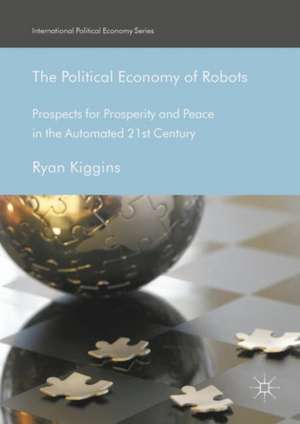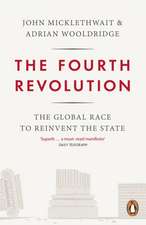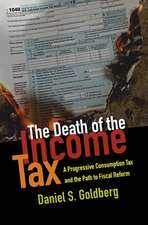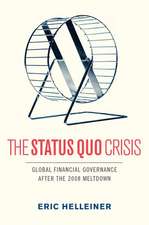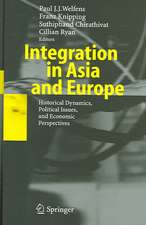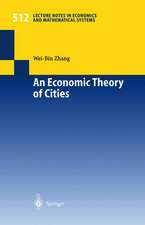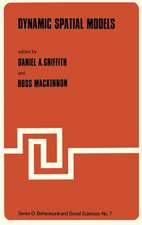The Political Economy of Robots: Prospects for Prosperity and Peace in the Automated 21st Century: International Political Economy Series
Editat de Ryan Kigginsen Limba Engleză Hardback – 2 oct 2017
| Toate formatele și edițiile | Preț | Express |
|---|---|---|
| Paperback (1) | 584.85 lei 38-44 zile | |
| Springer International Publishing – 10 aug 2018 | 584.85 lei 38-44 zile | |
| Hardback (1) | 895.58 lei 6-8 săpt. | |
| Springer International Publishing – 2 oct 2017 | 895.58 lei 6-8 săpt. |
Din seria International Political Economy Series
- 9%
 Preț: 831.25 lei
Preț: 831.25 lei - 20%
 Preț: 751.84 lei
Preț: 751.84 lei - 17%
 Preț: 490.25 lei
Preț: 490.25 lei - 17%
 Preț: 363.48 lei
Preț: 363.48 lei - 20%
 Preț: 690.96 lei
Preț: 690.96 lei - 20%
 Preț: 627.55 lei
Preț: 627.55 lei - 9%
 Preț: 762.80 lei
Preț: 762.80 lei -
 Preț: 430.59 lei
Preț: 430.59 lei -
 Preț: 428.68 lei
Preț: 428.68 lei -
 Preț: 147.23 lei
Preț: 147.23 lei - 20%
 Preț: 566.64 lei
Preț: 566.64 lei -
 Preț: 385.08 lei
Preț: 385.08 lei -
 Preț: 389.11 lei
Preț: 389.11 lei - 15%
 Preț: 644.30 lei
Preț: 644.30 lei -
 Preț: 389.31 lei
Preț: 389.31 lei - 15%
 Preț: 644.30 lei
Preț: 644.30 lei -
 Preț: 413.84 lei
Preț: 413.84 lei -
 Preț: 387.38 lei
Preț: 387.38 lei - 15%
 Preț: 638.89 lei
Preț: 638.89 lei - 15%
 Preț: 644.63 lei
Preț: 644.63 lei - 18%
 Preț: 893.71 lei
Preț: 893.71 lei -
 Preț: 412.47 lei
Preț: 412.47 lei -
 Preț: 325.08 lei
Preț: 325.08 lei -
 Preț: 395.47 lei
Preț: 395.47 lei - 15%
 Preț: 641.85 lei
Preț: 641.85 lei -
 Preț: 391.40 lei
Preț: 391.40 lei -
 Preț: 388.34 lei
Preț: 388.34 lei - 15%
 Preț: 640.55 lei
Preț: 640.55 lei -
 Preț: 389.70 lei
Preț: 389.70 lei - 15%
 Preț: 646.30 lei
Preț: 646.30 lei - 15%
 Preț: 637.78 lei
Preț: 637.78 lei - 15%
 Preț: 643.84 lei
Preț: 643.84 lei -
 Preț: 386.99 lei
Preț: 386.99 lei - 15%
 Preț: 641.53 lei
Preț: 641.53 lei -
 Preț: 386.81 lei
Preț: 386.81 lei - 15%
 Preț: 639.73 lei
Preț: 639.73 lei - 18%
 Preț: 944.19 lei
Preț: 944.19 lei -
 Preț: 391.40 lei
Preț: 391.40 lei -
 Preț: 330.65 lei
Preț: 330.65 lei -
 Preț: 394.12 lei
Preț: 394.12 lei -
 Preț: 386.99 lei
Preț: 386.99 lei -
 Preț: 386.81 lei
Preț: 386.81 lei -
 Preț: 387.75 lei
Preț: 387.75 lei - 15%
 Preț: 634.68 lei
Preț: 634.68 lei -
 Preț: 392.60 lei
Preț: 392.60 lei - 15%
 Preț: 641.53 lei
Preț: 641.53 lei - 15%
 Preț: 640.06 lei
Preț: 640.06 lei - 15%
 Preț: 643.16 lei
Preț: 643.16 lei - 15%
 Preț: 642.68 lei
Preț: 642.68 lei - 15%
 Preț: 641.85 lei
Preț: 641.85 lei
Preț: 895.58 lei
Preț vechi: 1092.17 lei
-18% Nou
Puncte Express: 1343
Preț estimativ în valută:
171.36€ • 178.94$ • 141.51£
171.36€ • 178.94$ • 141.51£
Carte tipărită la comandă
Livrare economică 15-29 aprilie
Preluare comenzi: 021 569.72.76
Specificații
ISBN-13: 9783319514659
ISBN-10: 3319514652
Pagini: 359
Ilustrații: XVII, 336 p.
Dimensiuni: 148 x 210 mm
Greutate: 0.58 kg
Ediția:1st ed. 2018
Editura: Springer International Publishing
Colecția Palgrave Macmillan
Seria International Political Economy Series
Locul publicării:Cham, Switzerland
ISBN-10: 3319514652
Pagini: 359
Ilustrații: XVII, 336 p.
Dimensiuni: 148 x 210 mm
Greutate: 0.58 kg
Ediția:1st ed. 2018
Editura: Springer International Publishing
Colecția Palgrave Macmillan
Seria International Political Economy Series
Locul publicării:Cham, Switzerland
Cuprins
Chapter 1. Introduction (Kiggins).- Chapter 2. The Politics of Global Value Chains (Cox and Wartenbe).- Chapter 3. Drug Smuggling and Automated Borders: A Losing Battle of Escalation or State/Non-State Symbiosis (Carey and Marak).- Chapter 4. Policy Implications of People Analytics and the Automated Workplace (Sharp).- Chapter 5. Automatic Medicine? Technology and the Future of Primary Health Care (Skinner and Franz).- Chapter 6. Repressive Robots and the Radical Possibilities of Emancipated Automation (Walsh and Sculos).- Chapter 7. The Political Economy of Bots: Theory and Method in the Study of Social Automation (Woolley).- Chapter 8. The Safe Hand (Gatch).- Chapter 9. Against our Better Judgment: Practical Wisdom in an Age of Smart(er) Machines (Thiele).- Chapter 10. Big Data, Artificial Intelligence, and Autonomous Policy Decision Making: A Crisis in International Relations Theory? (Kiggins).- Chapter 11. Diplomacy’s Lesson’s Learned: First World War submarine warfare and the 21st Century drone (Olmstead).- Chapter 12. Conflict, Cohesion and Comrades in Arms: Social Implications of Robotics in the Military (Manjikian).- Chapter 13. Robots writing Chinese and fighting underwater (Austin).- Chapter 14. Lethal Autonomous Systems and the Plight of the Non-combatant (Arkin).
Notă biografică
Ryan Kiggins is Visiting Assistant Professor in the Department of Political Science at the University of Central Oklahoma, USA. He edited The Political Economy of Rare Earth Elements: Rising Powers and Technological Change, which was published as part of the International Political Economy series in 2015.
Textul de pe ultima copertă
This collection examines implications of technological automation to global prosperity and peace. Focusing on robots, information communication technologies, and other automation technologies, it offers brief interventions that assess how automation may alter extant political, social, and economic institutions, norms, and practices that comprise the global political economy. In doing so, this collection deals directly with such issues as automated production, trade, war, state sanctioned robot violence, financial speculation, transnational crime, and policy decision making. This interdisciplinary volume will appeal to students, scholars and practitioners grappling with political, economic, and social problems that arise from rapid technological change that automates the prospects for human prosperity and peace.
Caracteristici
Makes a major contribution to studies of automation and its implications for global politics and society Provides insights into such significant issues as automated war and terrorism Offers a well-rounded and interdisciplinary analysis of the impact of robots on the international political economy Includes supplementary material: sn.pub/extras
